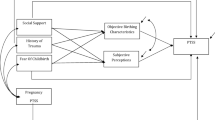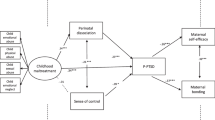Abstract
A significant minority of women can suffer from postpartum posttraumatic stress disorder (PP-PTSD) following childbirth, in particular if involving obstetrical complications. While peritraumatic dissociation has been repeatedly shown to play a significant role in coping in the aftermath of trauma, little is known about peritraumatic dissociation in relation to positive adaptation following childbirth or failure thereof. We studied a large sample of 846 women who were on average 3 months postpartum. Participants completed an anonymous survey with psychometric measures pertaining to peritraumatic dissociation, PP-PTSD, postpartum depression, and other psychiatric symptoms. Women who had assisted vaginal deliveries or unscheduled Cesareans reported higher peritraumatic dissociation levels than those who had regular vaginal deliveries or scheduled Cesareans. Peritraumatic dissociation predicted PP-PTSD above and beyond premorbid and other childbirth-related factors. In contrast, we found that when controlling for PP-PTSD symptoms, higher levels of peritraumatic dissociation were associated with lower depression and other psychiatric symptom severity. Childbirth can evoke a dissociative response for some women. Rather than the mere focus on the mode of delivery and premorbid health, our findings highlight the role of the women’s immediate emotional response in PP-PTSD. Screening women for dissociative responses immediately following childbirth may offer a tool for identifying women at risk for PP-PTSD. The multifaceted role of peritraumatic dissociation in psychological adaptation as potentially adaptive on the one hand, and maladaptive on the other, warrants future scientific attention.

Similar content being viewed by others
References
American Psychiatric Association (2013) Diagnostic and statistical manual of mental disorders, 5th edn. American Psychiatric Publishing, Arlington
Andersen LB, Melvaer LB, Videbech P, Lamont RF, Joergensen JS (2012) Risk factors for developing post-traumatic stress disorder following childbirth: a systematic review. Acta Obstet Gynecol Scand 91(11):1261–1272. https://doi.org/10.1111/j.1600-0412.2012.01476.x
Ayers S (2004) Delivery as a traumatic event: prevalence, risk factors, and treatment for postnatal posttraumatic stress disorder. Clin Obstet Gynecol 47(3):552–567
Ayers S, Bond R, Bertullies S, Wijma K (2016) The aetiology of post-traumatic stress following childbirth: a meta-analysis and theoretical framework. Psychol Med 46(6):1121–1134. https://doi.org/10.1017/S0033291715002706
Birmes P, Brunet A, Benoit M, Defer S, Hatton L, Sztulman H, Schmitt L (2005) Validation of the Peritraumatic dissociative experiences questionnaire self-report version in two samples of French-speaking individuals exposed to trauma. Eur Psychiatry 20(2):145–151. https://doi.org/10.1016/j.eurpsy.2004.06.033
Blevins CA, Weathers FW, Davis MT, Witte TK, Domino JL (2015) The posttraumatic stress disorder checklist for DSM-5 (PCL-5): development and initial psychometric evaluation. J Trauma Stress 28(6):489–498. https://doi.org/10.1002/jts.22059
Boudou M, Sejourne N, Chabrol H (2007) Childbirth pain, perinatal dissociation and perinatal distress as predictors of posttraumatic stress symptoms. Gynecol Obstet Fertil 35(11):1136–1142. https://doi.org/10.1016/j.gyobfe.2007.09.014
Bovin MJ, Marx BP, Weathers FW, Gallagher MW, Rodriguez P, Schnurr PP, Keane TM (2016) Psychometric properties of the PTSD checklist for diagnostic and statistical manual of mental disorders–fifth edition (PCL-5) in veterans. Psychol Assess 28(11):1379–1391. https://doi.org/10.1037/pas0000254
Briere J, Scott C, Weathers F (2005) Peritraumatic and persistent dissociation in the resumed etiology of PTSD. Am J Psychiatry 162(12):2295–2301. https://doi.org/10.1176/appi.ajp.162.12.2295
Bui E, Brunet A, Olliac B, Very E, Allenou C, Raynaud JP, Claudet I, Bourdet-Loubère S, Grandjean H, Schmitt L, Birmes P (2011) Validation of the Peritraumatic dissociative experiences questionnaire and Peritraumatic distress inventory in school-aged victims of road traffic accidents. Eur Psychiatry 26(2):108–111. https://doi.org/10.1016/j.eurpsy.2010.09.007
Choi KR, Seng JS (2016) Predisposing and precipitating factors for dissociation during labor in a cohort study of posttraumatic stress disorder and childbearing outcomes. J Midwifery Women's Health 61(1):68–76. https://doi.org/10.1111/jmwh.12364
Cook N, Ayers S, Horsch A (2018) Maternal posttraumatic stress disorder during the perinatal period and child outcomes: a systematic review. J Affect Disord 225:18–31. https://doi.org/10.1016/j.jad.2017.07.045
Dekel S, Stuebe C, Dishy G (2017) Childbirth induced posttraumatic stress syndrome: a systematic review of prevalence and risk factors. Front Psychol 8
Derogatis LR (1993) BSI brief symptom inventory: administration, scoring, and procedure manual, 4th edn. National Computer Systems, Minneapolis
Gray MJ, Litz BT, Hsu JL, Lombardo TW (2004) Psychometric properties of the life events checklist. Assess 11(4):330–341. https://doi.org/10.1177/1073191104269954
Haagen JG, Moerbeek M, Olde E, van der Hart O, Kleber RJ (2015) PTSD after childbirth: a predictive ethological model for symptom development. J Affect Disord 185:135–143. https://doi.org/10.1016/j.jad.2015.06.049
Koopman C, Classen C, Spiegel DA (1994) Predictors of posttraumatic stress symptoms among survivors of the Oakland/Berkeley, Calif., firestorm. Am J Psychiatry 151(6):888–894. https://doi.org/10.1176/ajp.151.6.888
Ladwig K, Marten-Mittag B, Deisenhofer I et al (2002) Psychophysiological correlates of peritraumatic dissociative responses in survivors of life-threatening cardiac events. Psychopathology 35(4):241–248. https://doi.org/10.1159/000063825
Lev-Wiesel R, Daphna-Tekoah S (2010) The role of peripartum dissociation as a predictor of posttraumatic stress symptoms following childbirth in Israeli Jewish women. J Trauma Dissociation 11(3):266–283. https://doi.org/10.1080/15299731003780887
Marcè LV (1858) Traité de la folie des femmes enceintes, des nouvelles accouchés et des nourrices, et des considerations medico-légales qui se rattachent à ce sujet [treatise on madness of pregnant women, with childbirth and nursing, and medicolegal considerations related to this subject]. Baillière et Fils, Paris
Marmar CR, Weiss DS, Metzler TJ (1997) The Peritraumatic dissociative experiences questionnaire. In: Wilson JP, Keane TM (eds) Assessing psychological trauma and PTSD. Guilford Press, New York, pp 412–428
McKenzie-McHarg K, Ayers S, Ford E, Horsch A, Jomeen J, Sawyer A, Stramrood C, Thomson G, Slade P (2015) Post-traumatic stress disorder following childbirth: an update of current issues and recommendations for future research. J Reprod Infant Psychol 33(3):219–237. https://doi.org/10.1080/02646838.2015.1031646
O'Hara MW, McCabe JE (2013) Postpartum depression: Current status and future directions. Annu Rev Clin Psychol 9:379–407. https://doi.org/10.1146/annurev-clinpsy-050212-185612
Olde E, van der Hart O, Kleber RJ, van Son MM, Wijnen HA, Pop VM (2005) Peritraumatic dissociation and emotions as predictors of PTSD symptoms following childbirth. J Trauma Dissociation 6(3):125–142. https://doi.org/10.1300/J229v06n03_06
Ozer EJ, Best SR, Lipsey TL, Weiss DS (2003) Predictors of posttraumatic stress disorder and symptoms in adults: a meta-analysis. Psychol Bull 129(1):52–73. https://doi.org/10.1037/0033-2909.129.1.52
Punamäki R, Komproe IH, Qouta S, Elmasri M, de Jong JM (2005) The role of peritraumatic dissociation and gender in the association between trauma and mental health in a palestinian community sample. Am J Psychiatry 162(3):545–551. https://doi.org/10.1176/appi.ajp.162.3.545
Ross LE, Evans SG, Sellers EM, Romach MK (2003) Measurement issues in postpartum depression part 1: anxiety as a feature of postpartum depression. Arch Women's Ment Health 6(1):51–57. https://doi.org/10.1007/s00737-002-0155-1
Rubin DB (2009) Multiple imputation for nonresponse in surveys, vol 307. Wiley, Hoboken
Segre LS, O'Hara MW, Arndt S, Stuart S (2007) The prevalence of postpartum depression: the relative significance of three social status indices. Soc Psychiatry Psychiatr Epidemiol 42(4):316–321. https://doi.org/10.1007/s00127-007-0168-1
Spiegel D (1991) Dissociation and trauma. In: Tasman A, Goldfinger SM (eds) American psychiatric press review of psychiatry, vol 10. American Psychiatric Association, Arlington, pp 261–275
Stramrood C, Slade P (2017) A woman afraid of becoming pregnant again: posttraumatic stress disorder following childbirth. In: Paarlberg K, van de Wiel H (eds) Bio-psycho-social obstetrics and gynecology: a competency-oriented approach. Springer, Cham, pp 33–49. https://doi.org/10.1007/978-3-319-40404-2_2
Thiel F, Ein-Dor T, Dishy G, King A, Dekel S (2018) Examining symptom clusters of childbirth-related posttraumatic stress disorder. Prim Care Companion CNS Disord 20(5). https://doi.org/10.4088/PCC.18m02322
Van der Kolk BA, Van der Hart O (1989) Pierre Janet and the breakdown of adaptation in psychological trauma. Am J Psychiatry 146(12):1530–1540. https://doi.org/10.1176/ajp.146.12.1530
Vossbeck-Elsebusch AN, Freisfeld C, Ehring T (2014) Predictors of posttraumatic stress symptoms following childbirth. BMC Psychiatry 14
Weathers FW, Blake DD, Schnurr PP, Kaloupek DG, Marx BP, Keane TM (2013a) The life events checklist for DSM-5 (lec-5). Scale available from the National Center for PTSD at www.ptsd.va.gov.
Weathers FW, Litz BT, Keane TM, Palmieri PA, Marx BP, Schnurr PP (2013b) The ptsd checklist for DSM-5 (pcl-5). Scale available from the National Center for PTSD at www.ptsd.va.gov.
World Health Organization (2015) World health statistics 2015. Available at http://www.who.int/gho/publications/world_health_statistics/2015/en/
Yildiz PD, Ayers S, Phillips L (2017) The prevalence of posttraumatic stress disorder in pregnancy and after birth: a systematic review and meta-analysis. J Affect Disord 208:634–645. https://doi.org/10.1016/j.jad.2016.10.009
Acknowledgments
The authors would like to thank Ms. Shannon Henning for her generous support in initiating this research project. We also would like to thank Gabriella Dishy for developing the online survey.
Author information
Authors and Affiliations
Corresponding author
Ethics declarations
Ethical approval
All procedures performed in studies involving human participants were in accordance with the ethical standards of the institutional and/or national research committee and with the 1964 Helsinki declaration and its later amendments or comparable ethical standards. Partners (Massachusetts General Hospital) Human Research Committee granted this study exemption.
Informed consent
This study entailed an anonymous online survey, no personal identifiable information was collected. Participants were informed that by agreeing to complete the study survey, they are implying their consent to participate in the study.
Conflict of interest
The authors declare that they have no conflict of interest.
Additional information
Publisher’s note
Springer Nature remains neutral with regard to jurisdictional claims in published maps and institutional affiliations.
Rights and permissions
About this article
Cite this article
Thiel, F., Dekel, S. Peritraumatic dissociation in childbirth-evoked posttraumatic stress and postpartum mental health. Arch Womens Ment Health 23, 189–197 (2020). https://doi.org/10.1007/s00737-019-00978-0
Received:
Accepted:
Published:
Issue Date:
DOI: https://doi.org/10.1007/s00737-019-00978-0




